Home
- About
- Visit
- Exhibitions
- Events
- Get Involved
- Giving
Wednesday May 21, 2025, 1-2pm: Border Art in Special Collections & Archives
Location: Geisel Instruction Room 1
Explore border-related arts collections held by UC San Diego’s Special Collections & Archives, including artworks, artifacts, and artists’ books from the Border Art Workshop/Taller de Arte Fronterizo, inSite Archive, and more.
This librarian-guided exploration is geared specifically for undergraduate students across all disciplines. Dive deeper into the regional historical contexts of the Border Craft exhibit and learn about how you can use archives to inspire your own creative projects and research.
Tuesday, May 27, 2025, 6:30-8pm: Guest lecture by exhibiting artist Jackie Amézquita. Organized as part of the Department of Visual Arts’ Guest Lecture Series
Location: SME 149, Structural & Materials Engineering, UC San Diego
Saturday, March 1, 2025, 2–6 pm: Border Craft opening celebration
Location: Mandeville Art Gallery
RSVP
This event coincides with the Graduate Open Studios at the Visual Arts Facility. Open Studios will feature MFA and PhD artists’ open studios, exhibitions, screenings, and publications produced in the Department of Visual Arts. Exhibiting artist Isidro Pérez García performs at 3pm.
Wednesday, March 12th, 2025, 5-6pm: Reading by students in LTWR113: Intercultural Writing Workshop, led by Dr. Amy Sara Carroll (Associate Professor of Literature and Writing)
Location: Mandeville Art Gallery
Wednesday, April 2, 2025, 5-6pm: Fabiola Carranza’s The Mexican Husband / Un marido mexicano
Location: Mandeville Art Gallery
This bilingual adaptation of Bertolt Brecht’s one-act play “The Jewish Wife” (1937) follows the events of a husband’s final night with his wife in Los Angeles before running for the Mexican border. The Mexican Husband / Un marido mexicano is an account of the ways in which exclusionary immigration policies play out. It asks questions about the state of humanity in an era of immigration enforcement, border walls, and enduring prejudice, both visible and invisible. Fabiola Carranza is an artist, educator, and PhD candidate in Art Practice at UC San Diego.
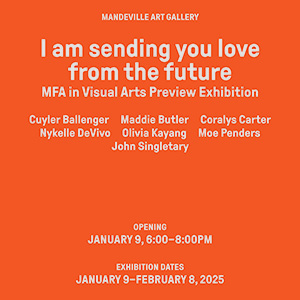
Thursday, January 9, 2025, 6-8pm, Free
Featuring a tour by exhibiting artists at 6:30pm. Light refreshments provided.
Participating Artists: Cuyler Ballenger, Maddie Butler, Coralys Carter, Nykelle DeVivo, Olivia Kayang, Moe Penders, John Singletary
Curatorial Advisor: Irene Georgia Tsatsos
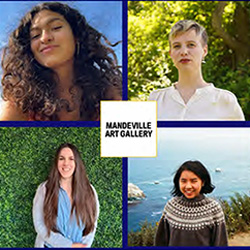
Wednesday, January 15, 2025, 5-6pm, Free
First year MFAs in Writing from the Department of Literature Fiona Martinez, Sarah Mullen, Georgia Wright, and Klytie Xu will read their work in connection with the exhibition I am sending you love from the future.
Organized as part of the Department of Literature's New Writing Series.
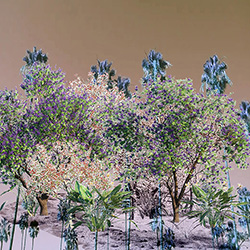
Guided by the themes and topics of Helen and Newton Harrison: California Work, UC San Diego graduate students present their own research and work.
Thursday December 5th, 12:30-1:30pm
Location: Mandeville Art Gallery
"Speculative Semitropic" lecture by Nico King (PhD Candidate in Art History, Theory, and Criticism with an emphasis in Art Practice, interdisciplinary artist, researcher in modern landscape history, and a trained landscape designer)
Speculative Semitropic
Since the so-called Age of Discovery, California's natural and cultural landscapes have inhabited a space between mythical projection and capitalist realism. In her talk, Nico King explores how human-made natures have been envisioned and engineered in the garden in the twentieth century, reshaping Southern California’s geographic realities in the Anthropocene.
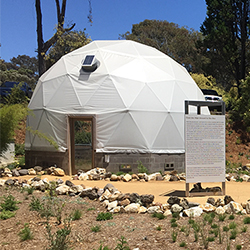
Saturday, November 23, 2024, 2:00-4:00 pm
Location: Mandeville Art Gallery
The Harrisons describe their first Future Garden, the Garden of Hot Winds and Warm Rains (1995), proposed for a museum in Bonn as “...a multi-layered story told with artifacts, media events, texts, and living materials, which all together engage the probable Greenhouse future directly. It is a work of art that will be garden, prediction, and promenade, a voyage of sorts... The task we set for this work is the exploration of eco-cultural collaborations that would make for a future no longer based on extraction. ... these gardens look at what a future could be like if conscious, mutually beneficial collaborations between human cultures (civilizations in all their complexities) and the cultures of nature (the life webs complicating and diversifying up to the space and energy available) became a norm.”
What does this multi-layered story look and feel like in the present?
Join us for a panel discussion with people who have collaborated with the Harrisons on Future Gardens including current on the ground proposals. The panel is moderated by Anne Douglas and Chris Fremantle. Featured speakers include:
Joshua Harrison is a filmmaker, environmentalist and educator. After a lifetime of connection to their process, principles, and outcomes, he began working directly with his parents Helen and Newton Harrison in 2012 to support strategy, large projects and overall development for the Center for the Study of the Force Majeure at UC Santa Cruz. He became Director following the recent death of Newton Harrison in 2022. Josh has been engaged in the intersection of art and ecology since participating in middle school demonstrations on the first Earth Day in 1970. His work centers around bringing together artists, scientists, engineers, planners and visionaries to design regenerative systems and policies that address issues raised by global temperature rise at the scale that they present.
Gabriel Harrison is Associate Director and Curator of Galleries and Exhibitions, at Stanford University, Department of Art & Art History. His work sits at the intersection between the curatorial process, installation art, and exhibition design. Trained as an architect, Gabriel has designed exhibitions for major museums in the U.S. and in Europe, as well as being a founding member of the Harrison Studio, curating, teaching design, and working with city agencies to integrate art into public spaces. Gabriel holds both a B.A. Arch. and an M.Arch. from U.C. Berkeley and attended the Royal Danish Academy of Art and Architecture in Copenhagen, where he lived and worked for a decade, including creating exhibitions for the Danish National Museum and curating the Danish National Pavilion for a previous Venice Architecture Biennale.
Laura Fillmore is an artist and community organizer whose current work includes collaborating with artists and firefighters around reintroducing cultural fire on the landscape with the BOD for the Center for the Force Majeure, establishing a community makerspace, and working on a community-led futurist curriculum as part of her focus on directing the Woodfords Indian Education Center, a California Office of Education wrap-around program offering an integrated program of indigenous arts and culture, rigorous academic instruction, recreation, and anti-racist, community-based social justice.
Benny Fillmore served on the founding board of directors for Wà:šiw Wagayay Mangal “House Where Wà:šiw is Spoken,” a language immersion school run by Wà:šiw “itlu Gawgayay,” a non-profit founded by the Wàši:šiw “Washoe People from Here.” He founded Demlu ‘uli Mongil, on the Dresslerville Ranch, and stewards it still. He was recently appointed to the Washoe Cultural Resources Advisory Board (WCRAC); a board of culturally competent Elders who make decisions about what the Washoe Tribe will honor (or avoid) in regards to the work of educators, cultural workers and the Tribal Historic Preservation Officer (THPO). A ceremonial leader, Benny is often asked for his help by others when healing is needed. A traditional singer, he is currently working on bringing back Wà:šiw songs and teaching his sons and grandchildren for the future, and contributing to the work of The Center for the Force Majeure in forests and future gardens on his homelands.
Moderators:
Anne Douglas is Professor Emerita, Gray’s School of Art, Robert Gordon University, Scotland, exploring the changing place of the artist in public life. This research has increasingly focused on art and the environmental crisis from a practice-led research perspective. She co-produced the Harrisons’ work “On the Deep Wealth of this Nation, Scotland” (2017) in collaboration with Newton Harrison and the Centre for the Study of the Force Majeure, University of California Santa Cruz.
Chris Fremantle is a researcher and producer of award-winning projects. He was producer on the Harrisons’ project “Greenhouse Britain: Losing Ground, Gaining Wisdom.” He is a longstanding member of the international ecoart network and co-editor of “Ecoart in Action,” a collection of activities, case studies and provocations drawn from the network. He lectures at Gray’s School of Art, Robert Gordon University, Scotland.
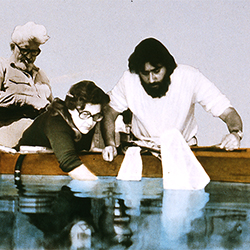
Tuesday, November 19, 2024, 6:30 pm
Location: SME 149, Structural & Materials Engineering, UC San Diego
Helen Mayer Harrison and Newton Harrison, known as ‘the Harrisons’, dedicated five decades to exploring and demonstrating a new form of artistic practice, centered on “…doing no work that does not attend to the wellbeing of the web of life.” Their collaborative practice pioneered a way of drawing together art and ecology. They closely observed, often with irony and humor, how human intervention disrupts the dynamics of life as a web of interrelationships. The authors ‘think with’ the Harrisons, critically tracing their poetics as a re-imaging and reconfiguring of the arts in response to the unfolding planetary crisis. They draw parallels between the artists’ poetics and rethinking in the philosophy of science, particularly drawing on the philosopher of science, Isabelle Stengers.
Thinking with the Harrisons is for anyone concerned with the implications of ecological thought and practice as a reimagining of public life, including the interaction of art and science. Throughout their joint practice, the Harrisons sought to engage policy makers, governments, ecologists, artists, and the natural world, sensitizing us to the crises that emerge from grounded experiences of place and time.
Anne Douglas is a Professor Emerita, Gray’s School of Art, Robert Gordon University, Scotland, exploring the changing place of the artist in public life. This research has increasingly focused on art and the environmental crisis from a practice-led research perspective. She co-produced the Harrisons’ work “On the Deep Wealth of this Nation, Scotland” (2017) in collaboration with Newton Harrison and the Centre for the Study of the Force Majeure, University of California Santa Cruz.
Chris Fremantle is a researcher and producer of award-winning projects. He was producer on the Harrisons’ project “Greenhouse Britain: Losing Ground, Gaining Wisdom.” He is a longstanding member of the international ecoart network and co-editor of “Ecoart in Action,” a collection of activities, case studies and provocations drawn from the network. He lectures at Gray’s School of Art, Robert Gordon University, Scotland.
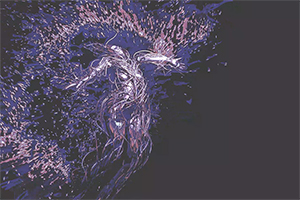
Wednesday, May 29, 2024, 1-5pm
Location: Performance Space, Visual Arts Facility, UC San Diego
UC San Diego students are invited to a movement and meditation workshop using extended reality and physical computing. Participants' created avatars and motion capture will be integrated into visuals for a new site-specific commission exploring liberated Black realities for the exterior video façade of the Mandeville Art Gallery.
In this workshop, participants will:

Tuesday, May 28, 2024, 6:30-8 pm
Location: SME 149, Structural & Materials Engineering, UC San Diego
LaJuné McMillian is a Multidisciplinary Artist, and Educator creating art that integrates performance, extended reality, and physical computing to question our contemporary forms of communication. They are passionate about discovering, learning, manifesting, and stewarding spaces for liberated Black Realities and the Black Imagination. McMillian was previously the Director of Skating at Figure Skating in Harlem, where they integrated STEAM and Figure Skating to teach girls of color about movement and technology.
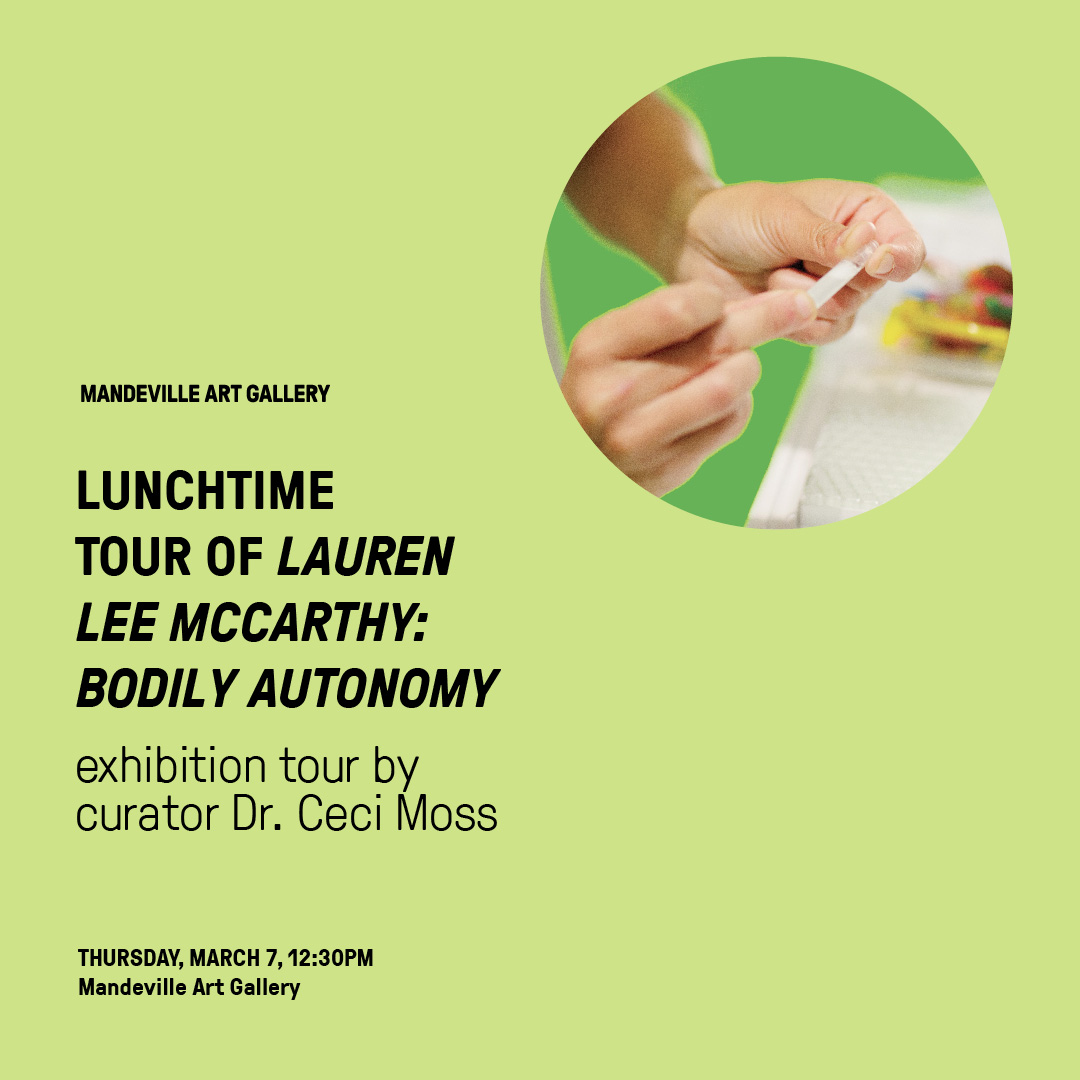
Curator Dr. Ceci Moss leads a free tour of the exhibition Lauren Lee McCarthy: Bodily Autonomy
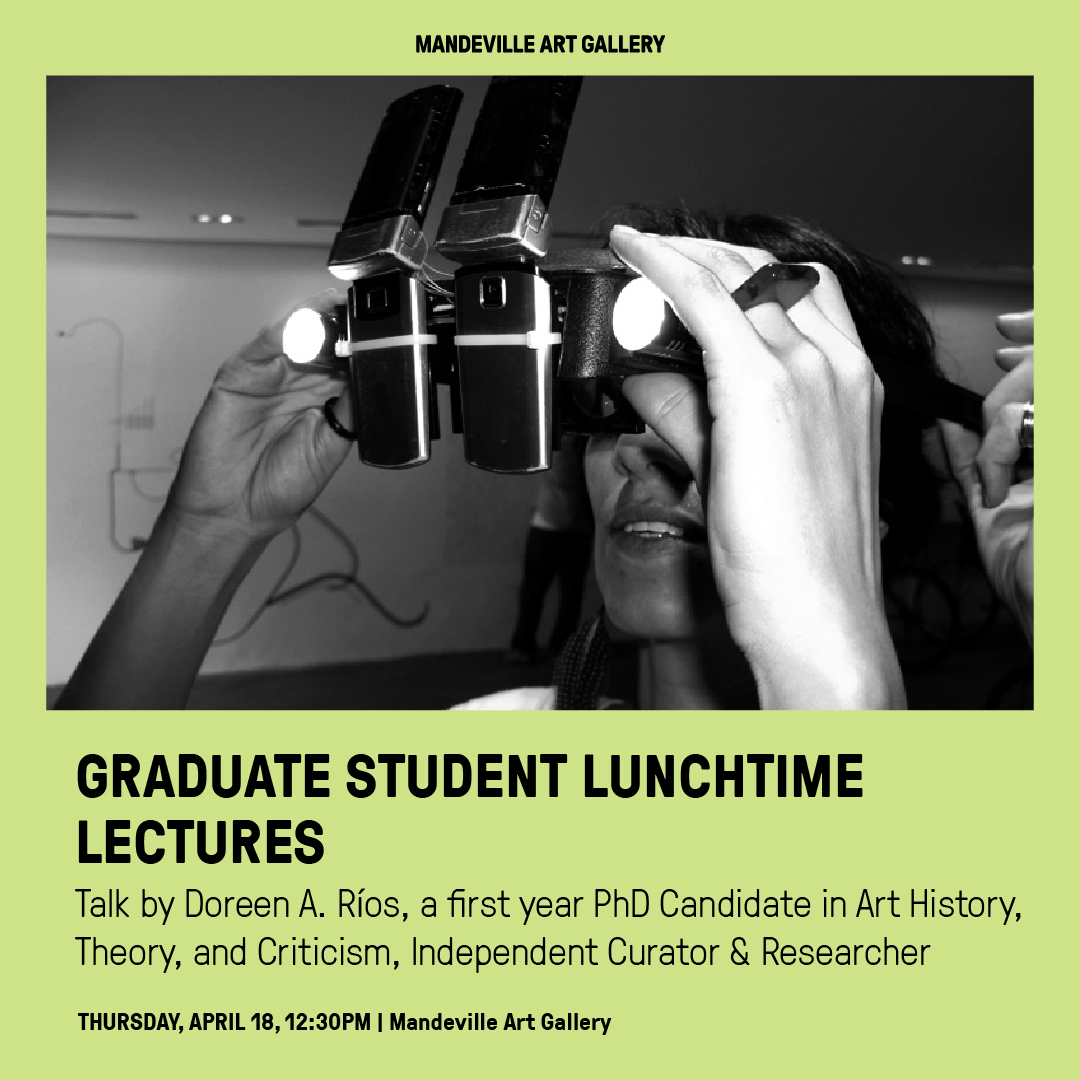 Graduate Student Lunchtime Lectures
Graduate Student Lunchtime LecturesGuided by the themes and topics of Lauren Lee McCarthy: Bodily Autonomy, UC San Diego graduate students present their own research and work.
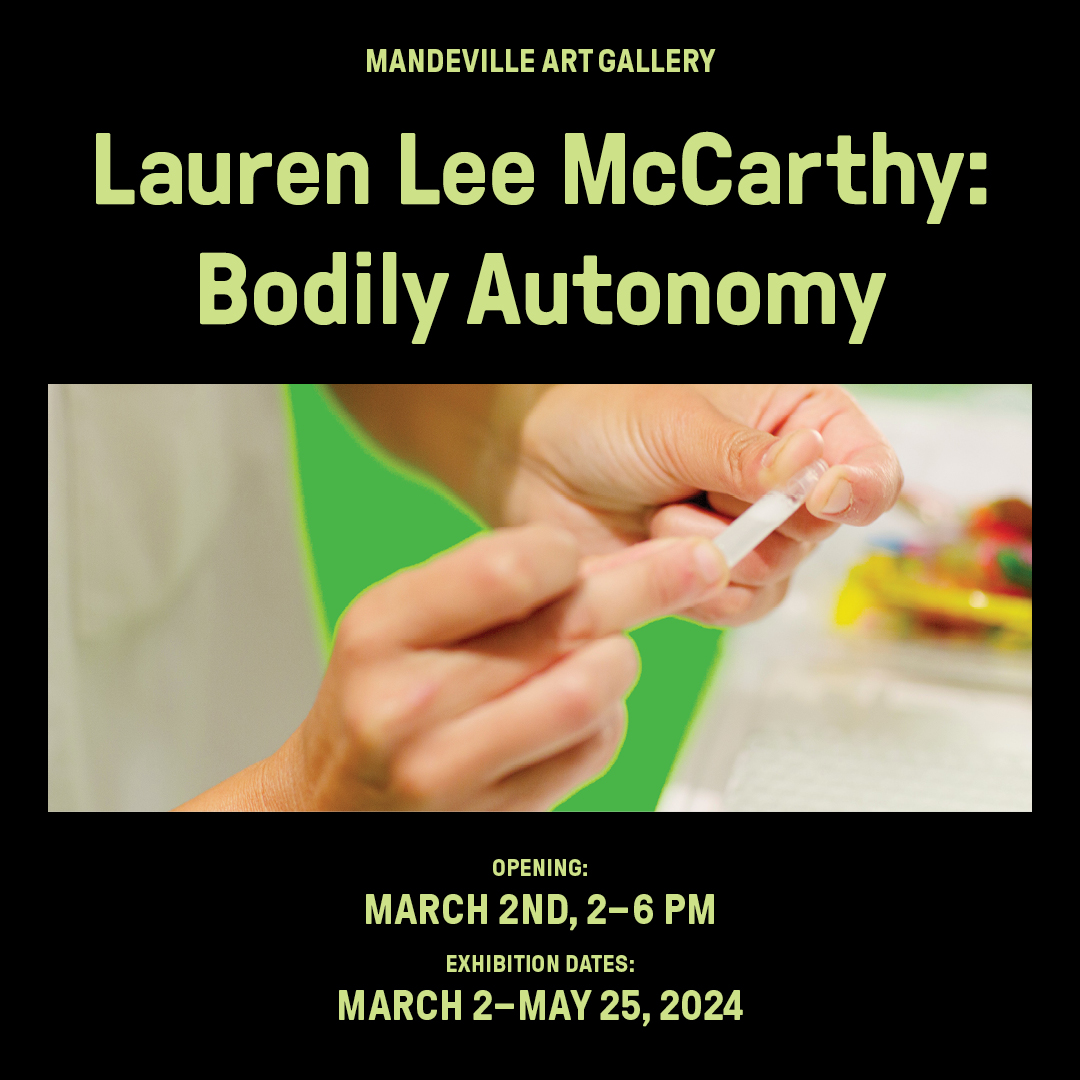 Lauren Lee McCarthy: Bodily Autonomy opening celebration
Lauren Lee McCarthy: Bodily Autonomy opening celebrationSaturday, March 2, 2024, 2–6 pm
During the event, exhibiting artist Lauren Lee McCarthy will activate the "Saliva Bar" from 2-4pm
This event coincides with the Graduate Open Studios at the Visual Arts Facility. Open Studios will feature MFA and PhD artists’ open studios, exhibitions, screenings, and publications produced in the Department of Visual Arts.
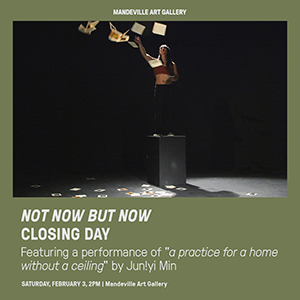
Saturday, February 3, 2024, 2pm-3pm
Closing performance of "a practice for a home without a ceiling" by Jun!yi Min
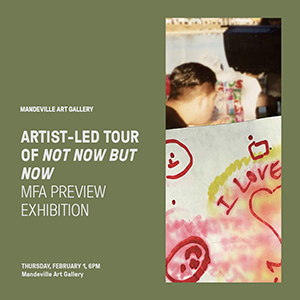
Thursday, February 1, 2024, 6pm
Artist-led tour of the exhibition
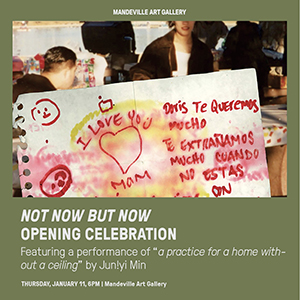
Thursday, January 11, 2024, 6-8 pm
Featuring a performance of "a practice for a home without a ceiling" by Jun!yi Min at 7:30pm. For this piece, Min recants childhood memories that revolve around an intimate relationship with a piece of clothing in a house of domestic tension, care, play, and loss. Audience members are expected to shift throughout the performance, from viewer to participant, stationary to moving. There will be mentions of death and parental disciplinary actions.
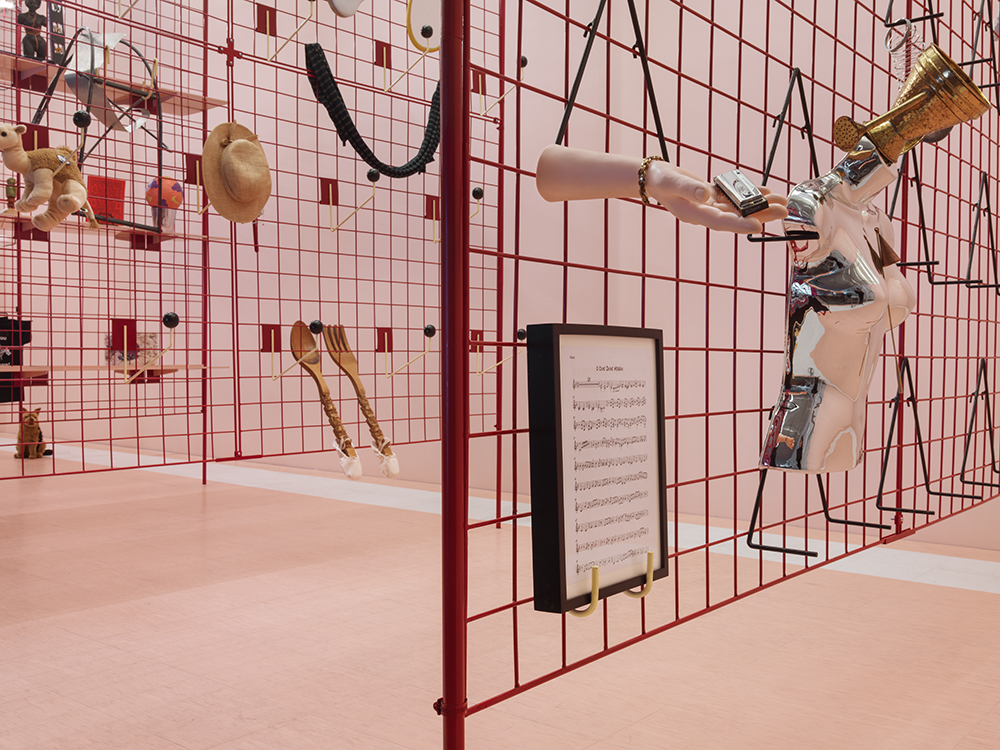 Monthly Lunchtime Curator-Led Tours & Exchange Days for Pia Camil’s A Pot for a Latch
Monthly Lunchtime Curator-Led Tours & Exchange Days for Pia Camil’s A Pot for a LatchThursday, October 26, 12:30–1:30 pm
Thursday, November 16, 12:30–1:30 pm
Thursday, December 7, 12:30–1:30 pm
Mandeville Art Gallery
On the designated days listed above, curator Dr. Ceci Moss leads a free tour of the exhibition How We Gather followed by an invitation to exchange objects via Pia Camil’s A Pot for a Latch. Visitors are asked to bring items with personal value and history to trade.
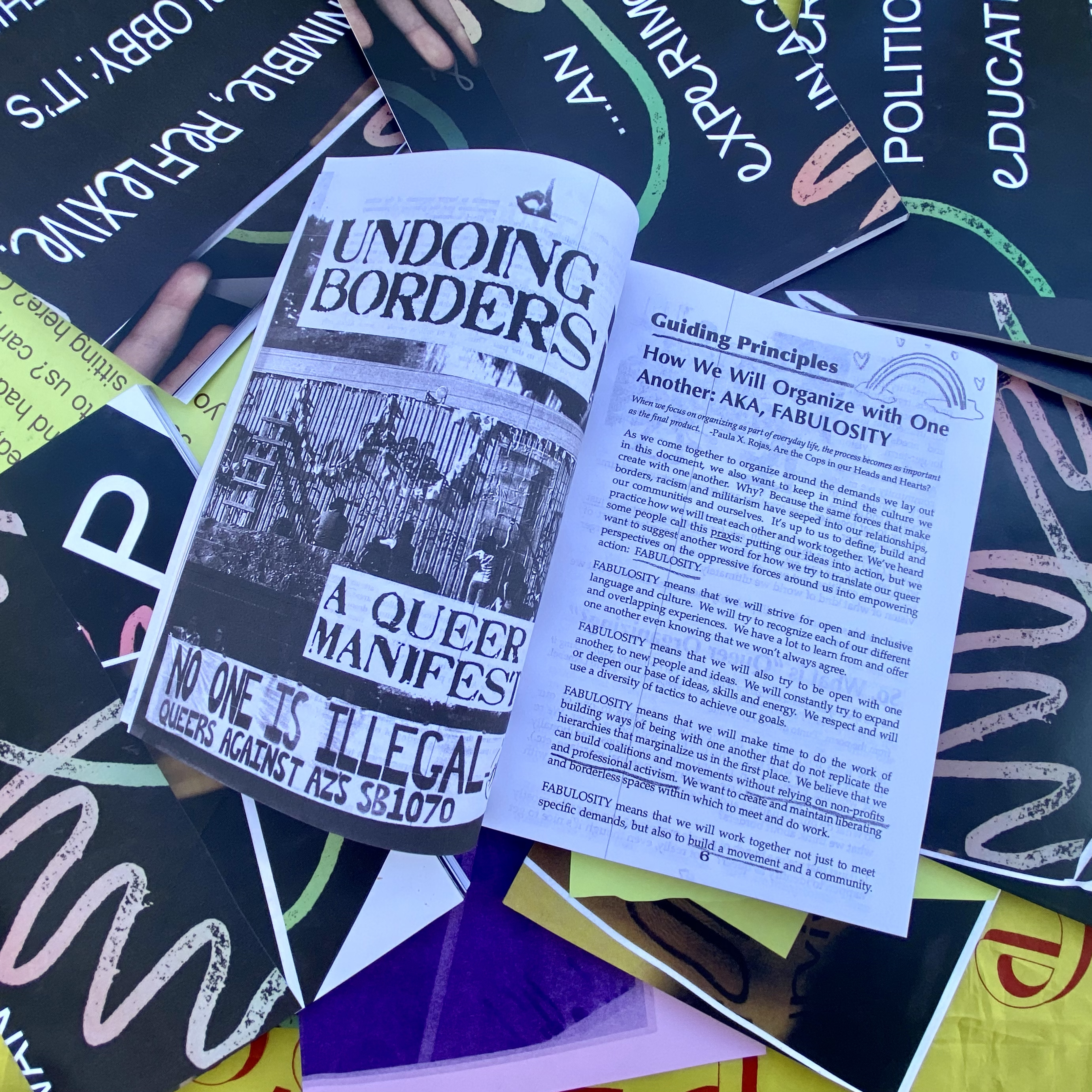 Scaffolding Autonomies: Scores for Daily Rehearsal
Scaffolding Autonomies: Scores for Daily RehearsalOnline Workshop led by Kimi Hanauer of the Center for Liberatory Practice and Poetry
Saturday, December 2nd, 2023, 2–4 pm ONLINE
Participants chronicle and rehearse practices for collective care and solidarity that emerge from everyday encounters. Through an exploration of artworks, poetry, theory, and political projects, they create a shared collection of scores for daily rehearsal that move us toward a horizon of autonomy and collective self-determination. Grounded in the framework of mutual aid, this workshop explores practices of collective care that sustain social movements and encourage daily bodily motion, experience, and presence.
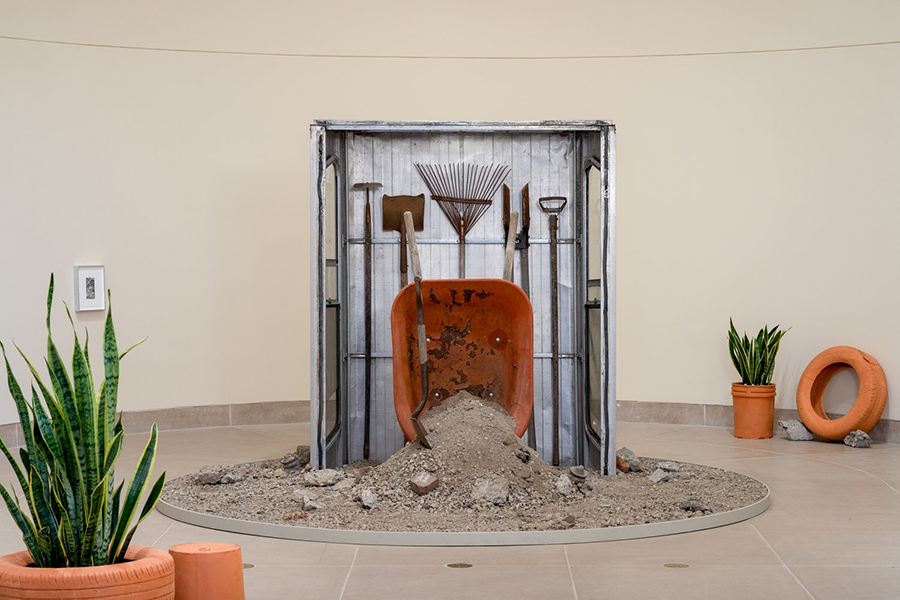 Artist Talk by noé olivas
Artist Talk by noé olivasTuesday, November 28th, 6:30pm
Location: SME (Structural & Materials Engineering Building) 149
Organized as part of the Department of Visual Arts’ Guest Lecture Series
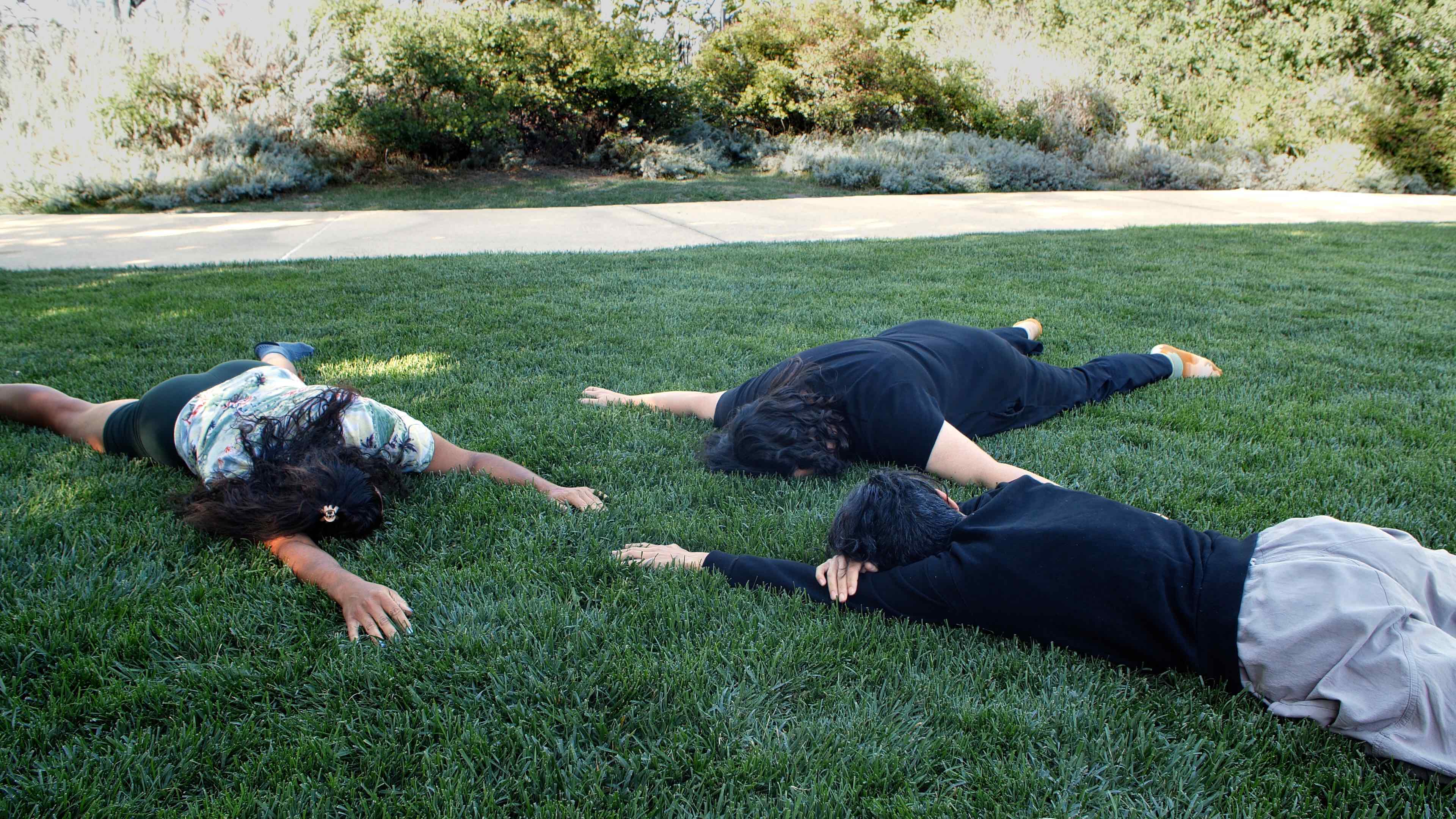 Touch Praxis
Touch PraxisWorkshop led by Nina Sarnelle and Selwa Sweidan
Saturday, November 11, 2–4 pm
Collaborators Nina Sarnelle and Selwa Sweidan lead this workshop exploring touch as a time-based medium and a system of co-creating knowledge. Participants will be led through somatic exercises, and have the option to engage in solo or small-group touch experiments. No previous experience required.
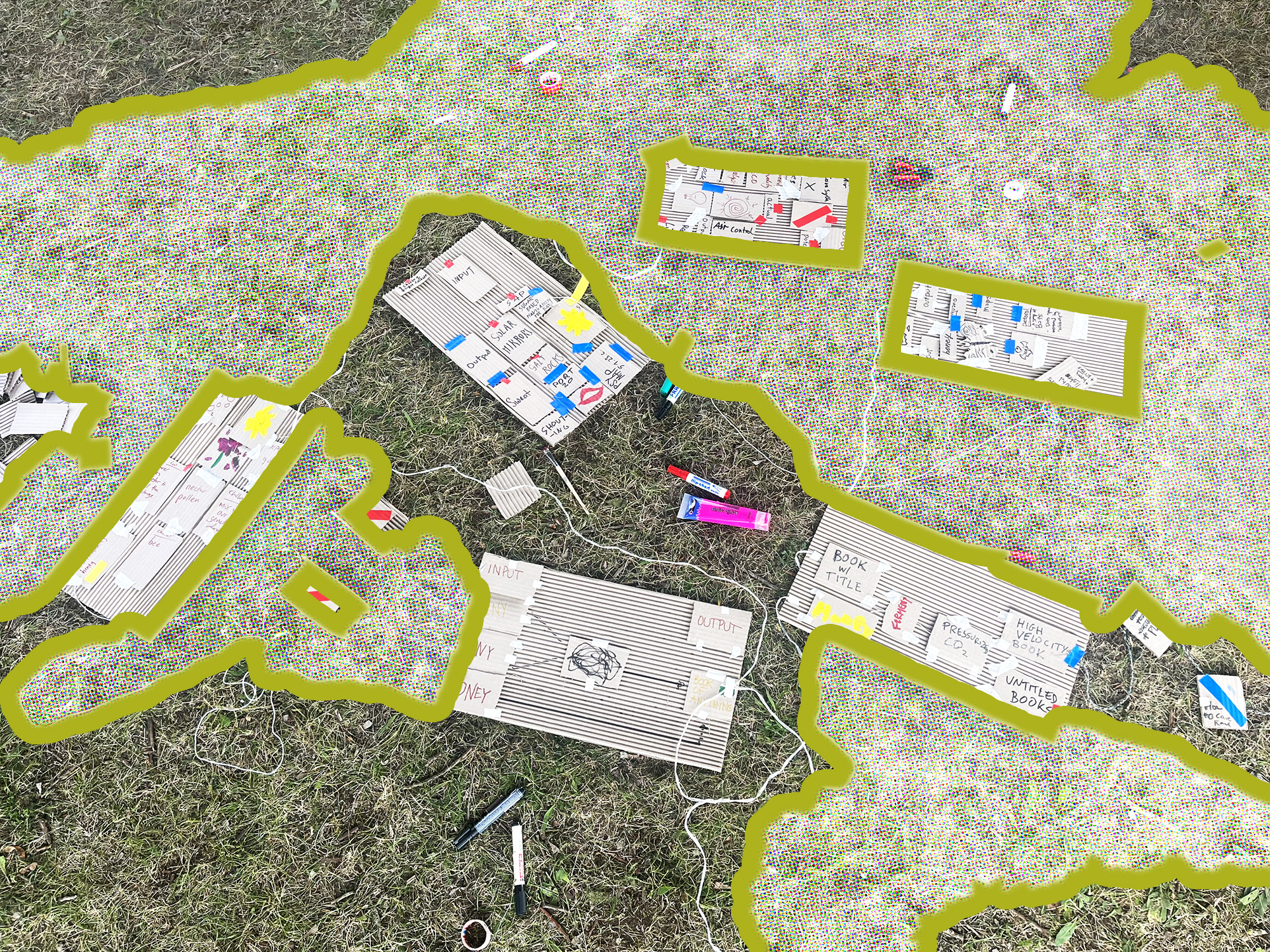
Workshop by Alice Yuan Zhang
Saturday, October 21, 2023, 2–4 pm
How might it feel to be in a digital network together, but outside the fraught domains of Big Tech? What stories would we tell one another if we could store them on our own terms? This workshop explores the intimate canvas of a local network through a joint exercise in creative writing and server hosting. Learn to make a web page, use the terminal, write with others, and weave a networked narrative. Participants will become familiar with the basic components of networking by making and feeling a web that is literally there in the room. It’s an accessible and intimate approach that aspires to open up critical questions regarding data governance, decentralization, digital commons, safety, and energy use, and empower participants to experiment with further acts of digital solidarity.
Participants are invited to bring their own laptops. No prior coding experience is necessary.
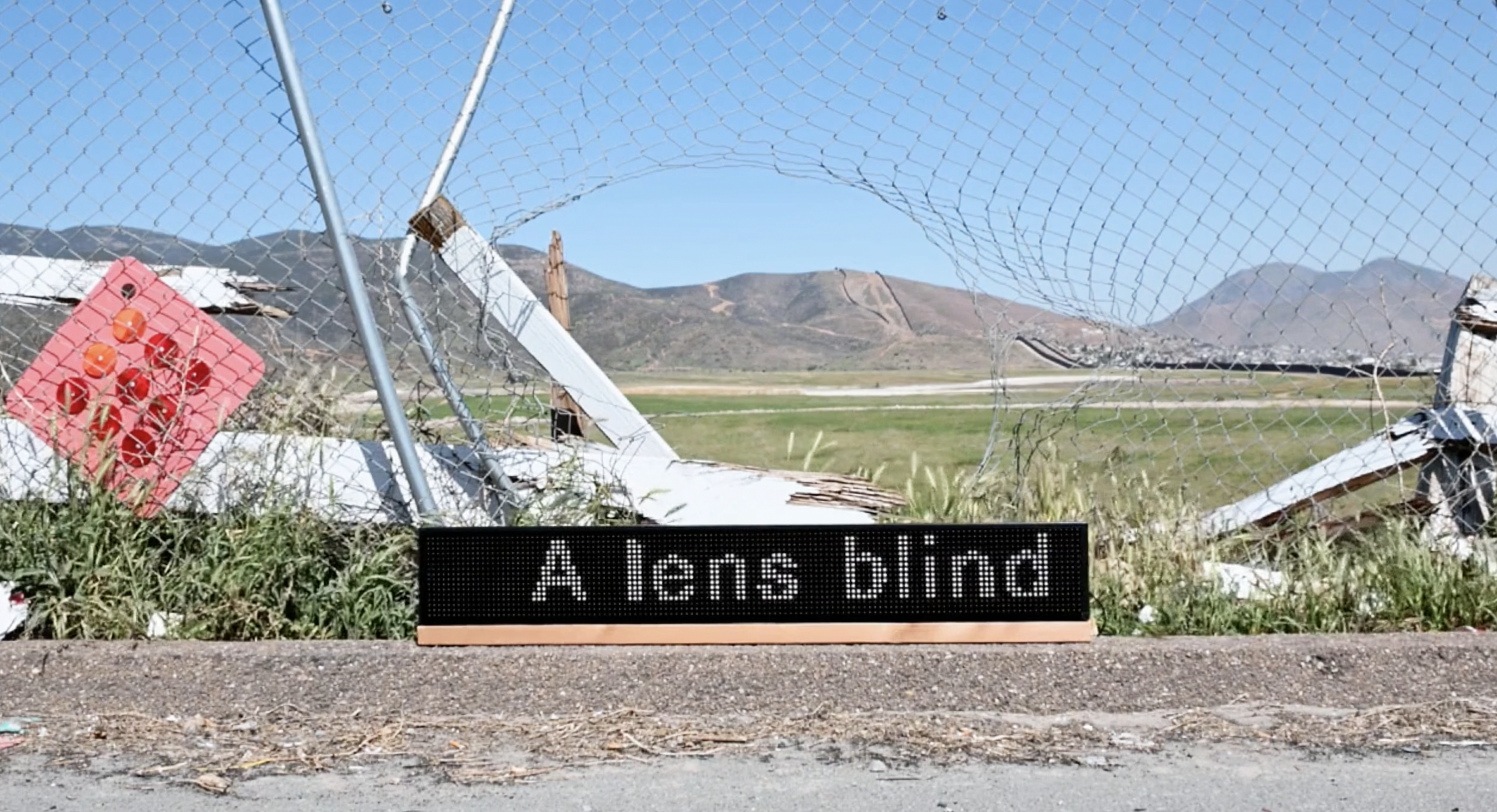
Saturday, October 14, 2023, 2–4 pm
Led by exhibiting artists Cog•nate Collective with Dr. Wayne Yang (UC San Diego professor and John Muir College provost) and Dina Gilio Whitaker (Colville Confederated Tribes descendant, scholar, educator, journalist and author in American Indian studies), this program expands on the underlying themes/aims of the artists’ new commission for the exterior screen of the Mandeville Art Gallery “And will be again…”.
Following a screening of Cog•nate Collective video work "Circumlocution: Border / Circunlocución: Frontera”, the conversation will address polemics and debates in relation to constructions of indigeneity, translation, and what it means to be accomplices in materializing visions of indigenous futurity – all while living in the shadow of the U.S./Mexico border. Inspired by Dr. Wayne Yang and Dr. Eve Tuck’s celebrated essay “Decolonization is not a metaphor,” this event will reflect on what solidarity with decolonial projects might look like in the local San Diego/Tijuana region.
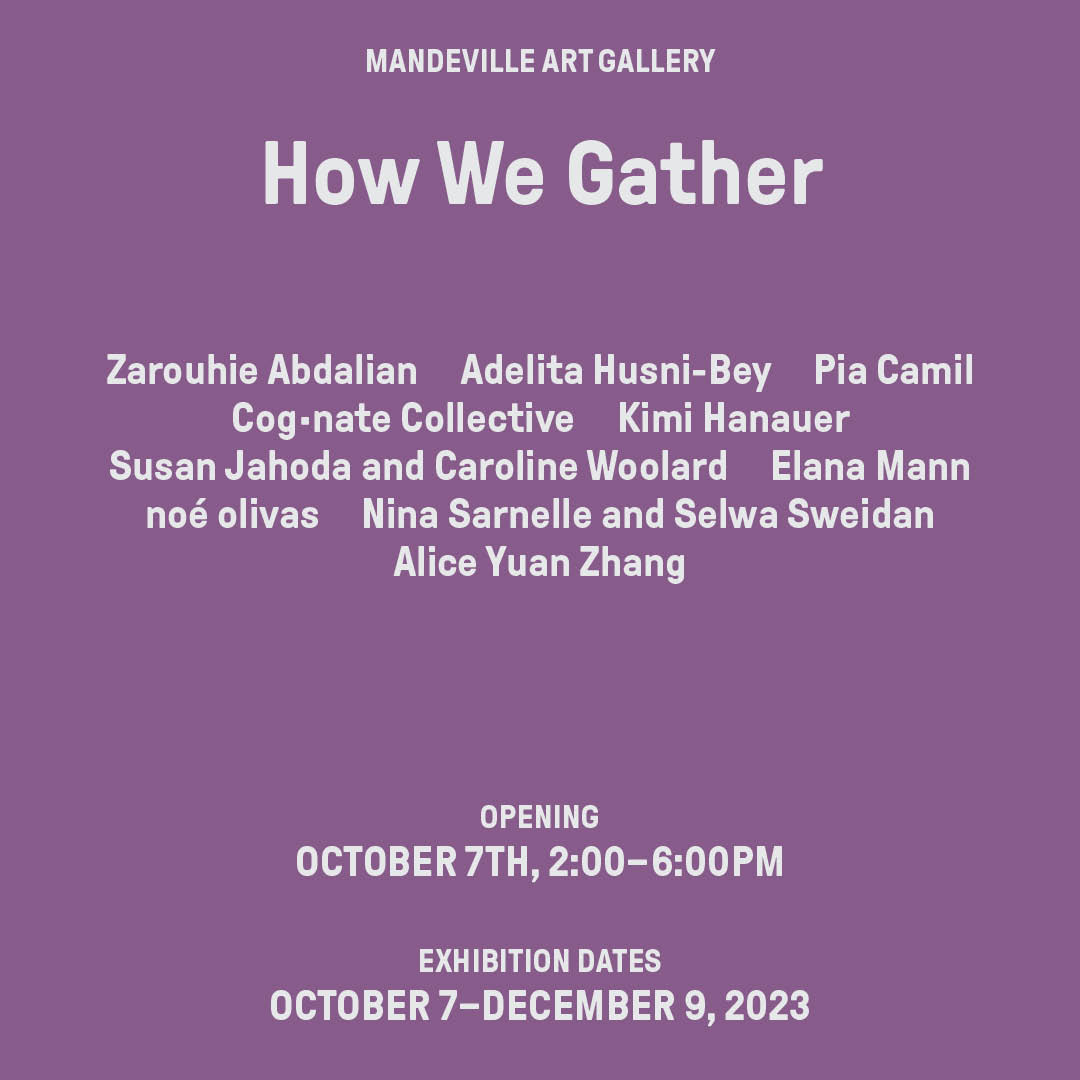
Opening Party Saturday October 7th, 2-6pm, Free
Featuring a new commission by Elana Mann and Sharon Chohi Kim, performed by the San Diego New Verbal Workshop at 4pm.
Taco catering 2-4pm, open bar 2-6pm. Park at Scholars Parking Lot.
The group exhibition How We Gather investigates the notion and enactment of solidarity across various contemporary artists’ practices through the lens of the pandemic.
Participating Artists:
Zarouhie Abdalian, Adelita Husni-Bey, Pia Camil, Cog•nate Collective, Kimi Hanauer, Susan Jahoda and Caroline Woolard, Elana Mann, noé olivas, Nina Sarnelle and Selwa Sweidan, Alice Yuan Zhang
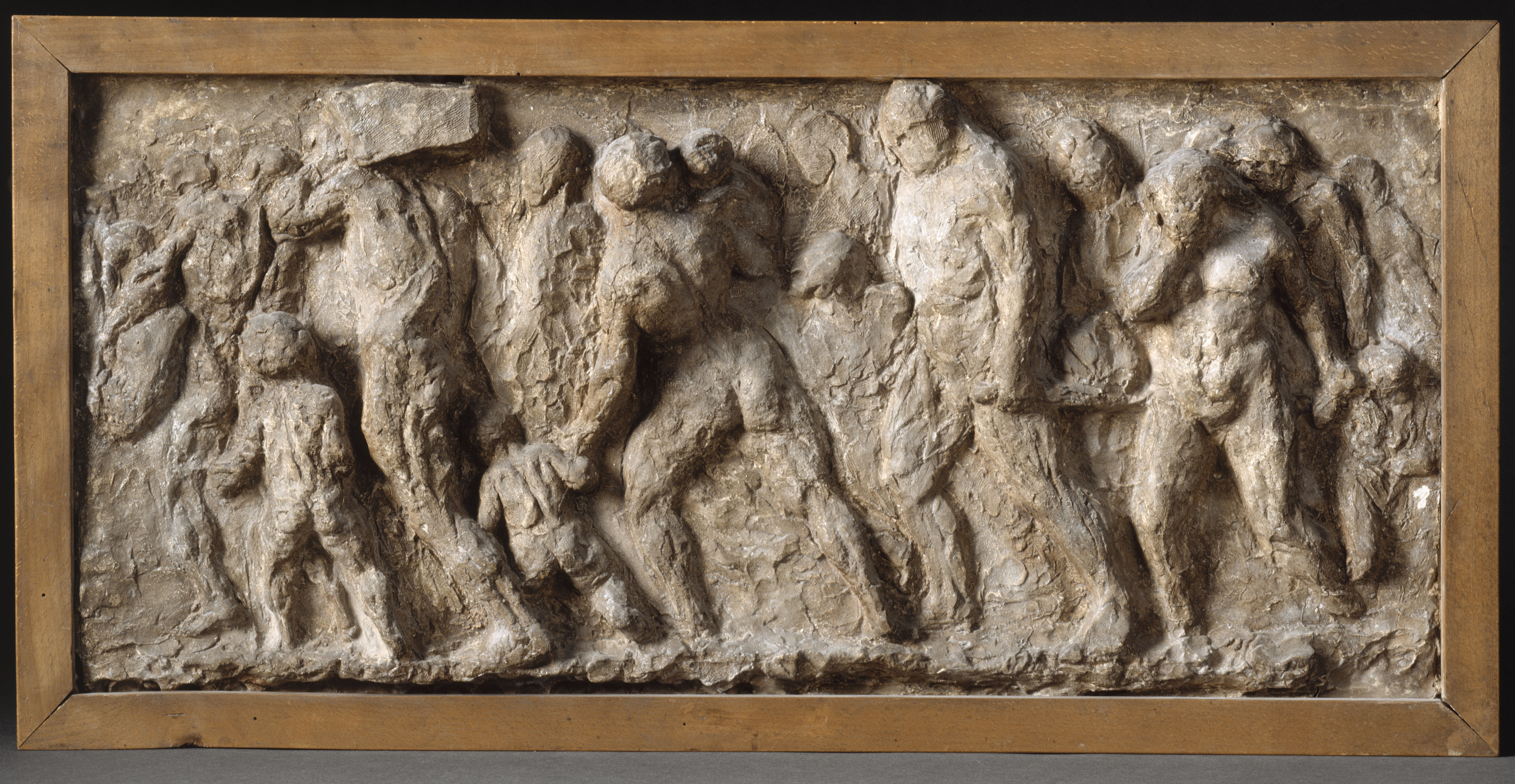
Lecture by Assistant Professor Jordan Rose
Friday June 2, 6:30 p.m.
Mandeville 103
Free
The period between the French Revolution of 1789 and the Paris Commune of 1871 has been dubbed “the century of exiles.” To many, this identification will sound odd, even misleading. It subordinates magnitude (the 1930s and ‘40s, the first decades of the 21st century) to scale. All the same, there is merit to the claim and its evident hyperbole. Revolution, urbanization, enclosure, industrialization, the first victories of Capital, and the consolidation of empire—these motors of displacement drove the 19th century’s most characteristic developments. Together, they transformed migration (forced or voluntary) into a mass phenomenon.
This talk, about the depiction of refugees in 19th-century Europe, introduces a project still in its infancy. Its argument is straightforward: we have much to learn from the paintings, sculptures, and prints that emerged in response to the new situation and experience. Here, Assistant Professor Jordan Rose will focus on a series of paintings and relief sculptures produced by Honoré Daumier in the years after the Revolution of 1848. These are special artworks—not only for their distinctive intensities and repetitions, but also because of the materials and techniques deployed in their making.
Jordan Rose is Assistant Professor of Art History in the Department of Visual Arts. Before joining the faculty at UCSD in 2016, he taught at the University of Vermont and UC Berkeley. His first book, "The Revolution Takes Form: Art and the Barricade in Nineteenth-Century France," will appear in Penn State University Press's spring 2024 catalogue.
Organized in conjunction with the exhibition ARE WE NOT DRAWN ONWARD TO NEW ERA.
Image: Honoré Daumier, Les Fugitifs, 1848/49
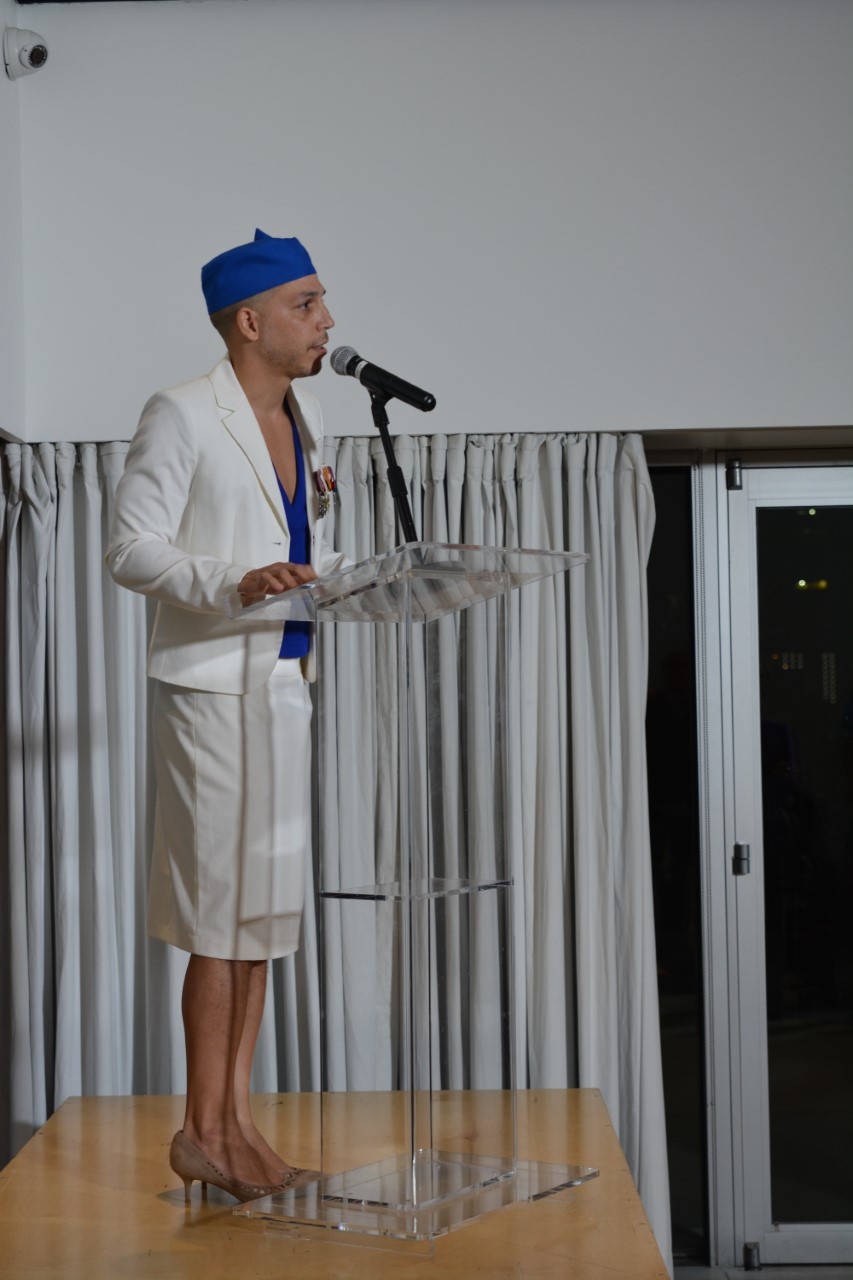
Performance by Associate Professor Malik Gaines
Thursday June 1, 6:30pm
Mandeville Art Gallery
Free
The Life Story of Meghan Markle is not a biography, but rather a reflection, through sound and speech, on popular incongruities, mixed approaches to elite legacies, suspicious desires, and the difficulty of appearing. Gaines’ short performance in the Mandeville Art Gallery and its vicinity takes strands of what’s present and combines them with speculations about elsewhere.
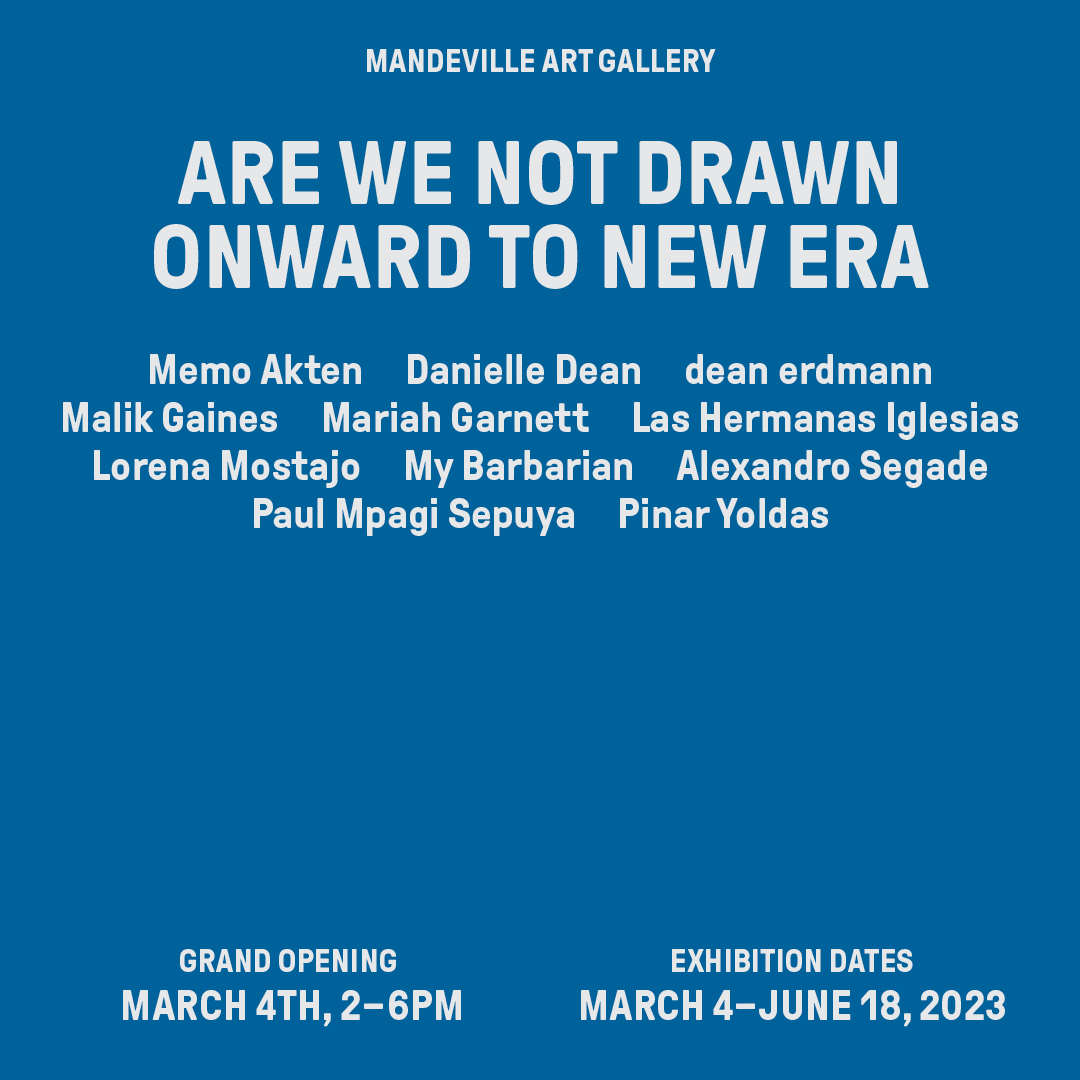 Grand Opening
Grand OpeningARE WE NOT DRAWN ONWARD TO NEW ERA
March 4, 2-6pm PST
Mandeville Art Gallery
Free